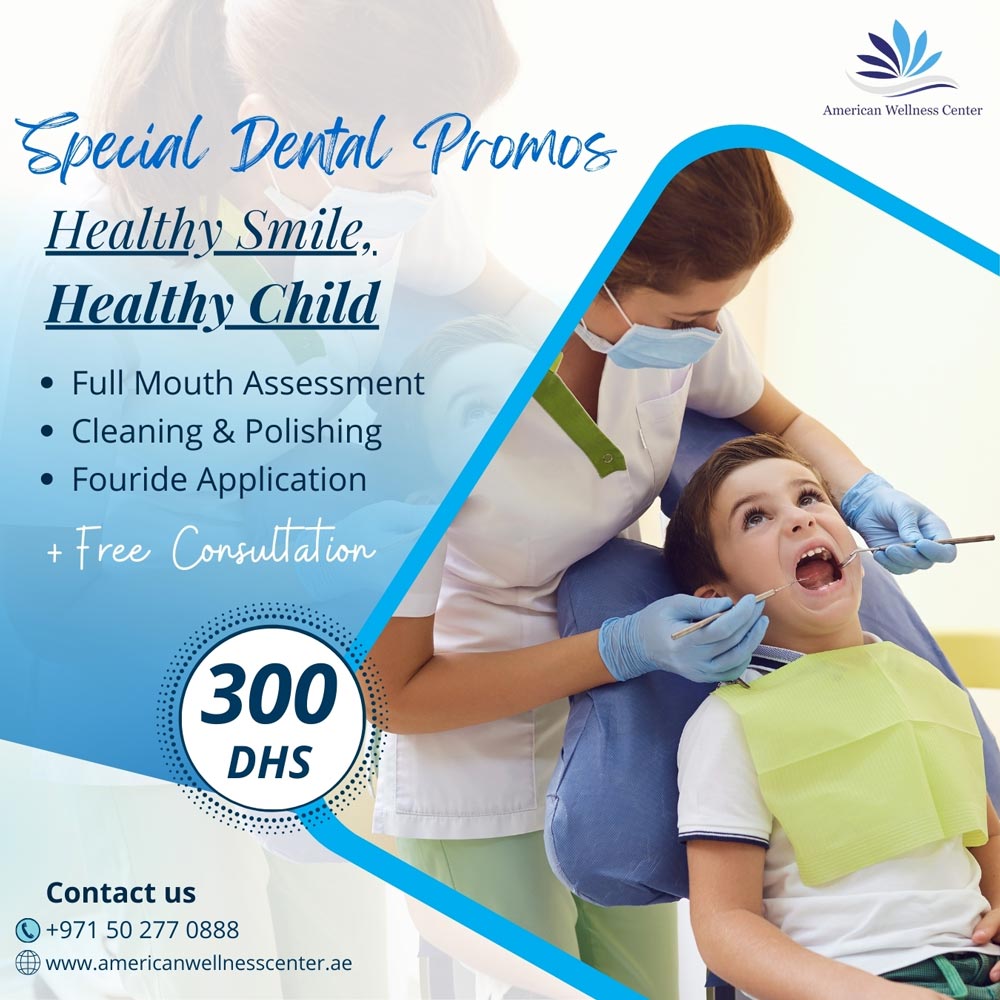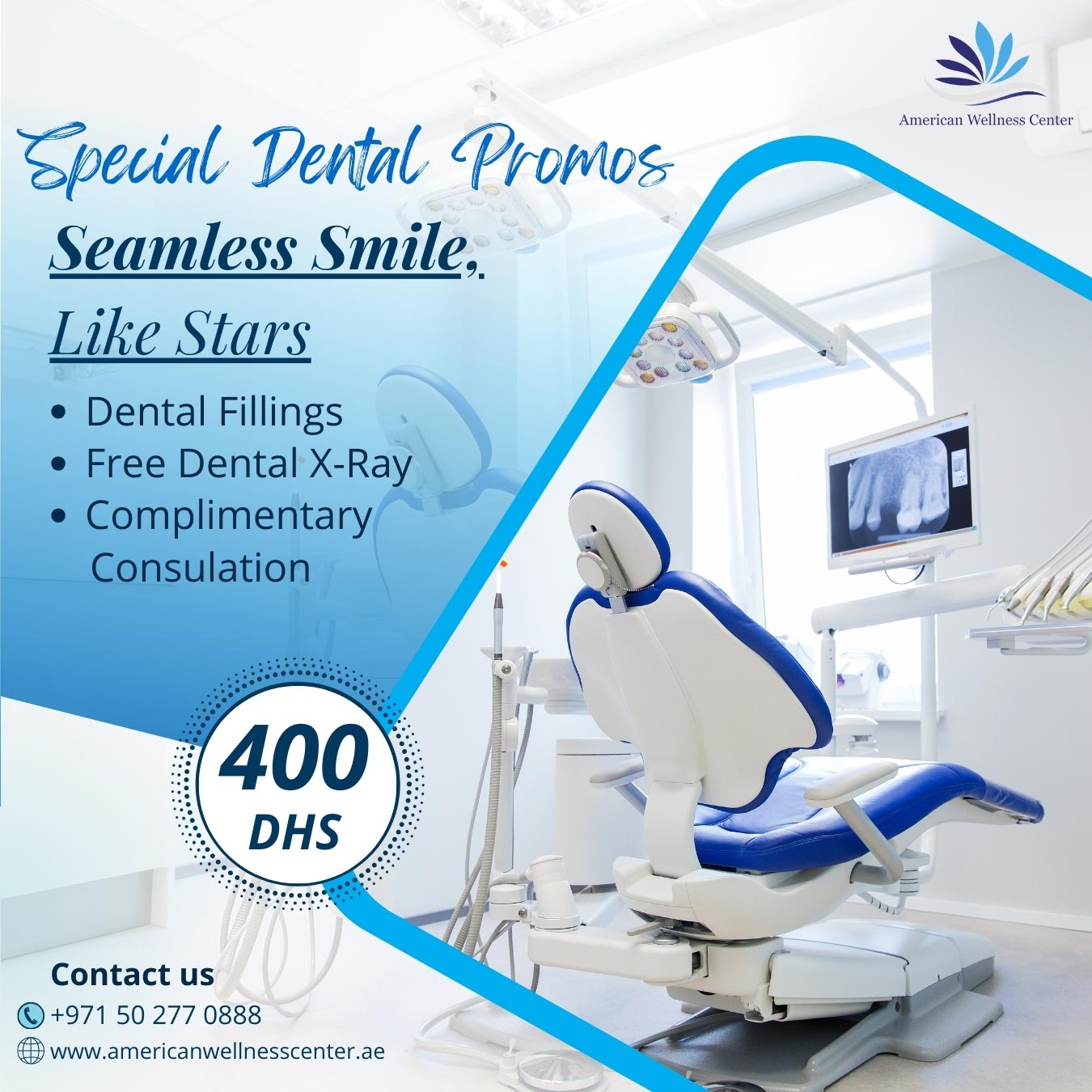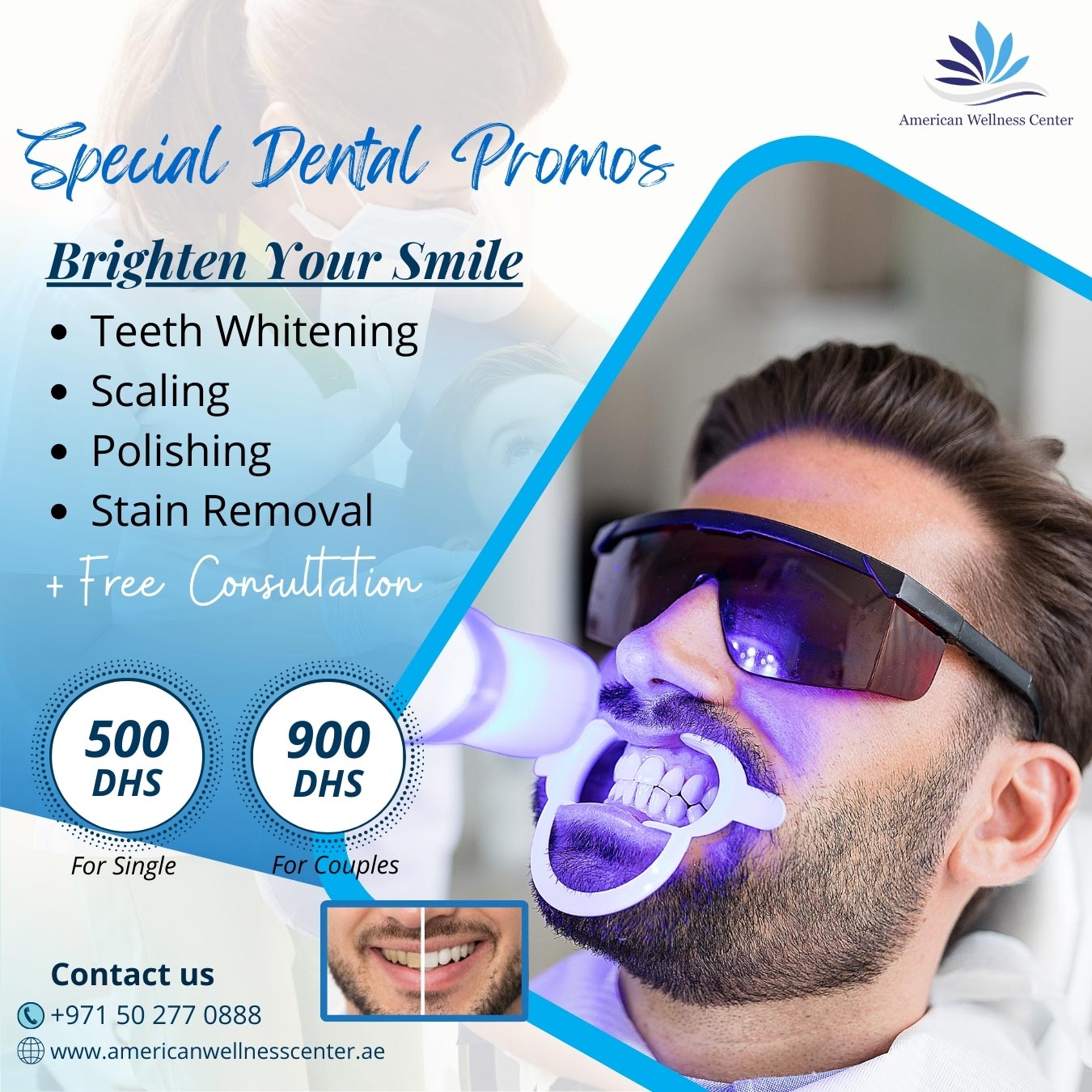Dentistry is a branch of healthcare focus on the diagnosis, treatment, and prevention of oral and dental conditions. Dentists, the professionals in this field, specializing in maintaining and improving oral health. Visiting a dentist is essential for not only addressing oral health issues, like cavities and gum disease, but also for enhancing the appearance of teeth through cosmetic dentistry. Our qualified and well-trained dentist at American wellness Center Dubai provide a wide range of services, including dental check-ups, cleanings, restorative procedures (such as fillings and crowns), orthodontic treatments, oral surgery, and more to our clients in Dubai and UAE.
What is oral health?
Oral health refers to the condition of one's teeth, gums, and mouth, and it plays a crucial role in overall wellbeing. Maintaining good oral health is not only about having a bright smile but also about ensuring the proper functioning of the mouth and its impact on the rest of the body.
Oral health is ultimately connected to our ability to eat and speak and physical wellbeing. Healthy teeth and gums allow us to chew our food effectively, facilitating proper digestion and nutrient absorption. When oral health deteriorates, it can lead to difficulties in eating, which can result in poor nutrition and overall health decline. Likewise, a healthy mouth enables clear and effective communication, which is vital for personal and professional relationships.
Medical implications:
Poor oral health is linked to various systemic health issues. Bacteria from oral infections can enter the bloodstream and potentially lead to conditions like endocarditis, a heart valve infection, and respiratory infections. Chronic gum disease has been associated with an increased risk of heart disease, stroke, and diabetes. Research also suggests a connection between periodontal disease and complications during pregnancy, such as low birth weight and preterm births.
Mental / emotional health implications
Another critical aspect of oral health is its impact on quality of life. Dental problems, such as toothaches, gum pain, and bad breath, can cause discomfort and social embarrassment. This can lead to reduced self-esteem and decreased overall happiness and wellbeing. Regular dental check-ups and proper oral hygiene help prevent these issues and contribute to a better quality of life.
By prioritizing oral health through regular dental check-ups, good oral hygiene practices, and a balanced diet, we can ensure not only a radiant smile but also a healthier, happier life. So, take care of your oral health – it's an investment in your overall wellbeing.
OUR SERVICES
At American Wellness Center Dubai, our well trained dentist offer regular dental check-ups that are essential for maintaining good oral health.
- Diagnosis and Treatment Planning Oral Hygiene Management and Instructions (Preventive Dentistry) Periodontal examination – Scaling and Polishing
- Pediatric Dentistry
- Simple Tooth Extractions
- Root canal treatments
- Cavity preparations and placement of restorations
- Bridges and crowns
- Partial Dentures
- Cosmetic Dentistry: Porcelain and composite Veneers
- Teeth Whitening
Signs that show you should consult a dentist:
Recognizing the signs of oral health issues is essential for addressing problems early and maintaining a healthy mouth. Here are some common signs that may indicate oral health problems:
- Tooth Pain or Sensitivity: If you experience toothaches, sharp pains when chewing, or increased sensitivity to hot or cold foods and beverages, it may signal tooth decay, cavities, or a dental infection.
- Bleeding Gums: Gums that bleed when you brush, or floss can be a sign of gum disease (gingivitis or periodontitis). Healthy gums should not bleed during routine oral care.
- Swollen or Red Gums: Inflammation and redness of the gums can be indicative of gum disease. Healthy gums should be pink and firm.
- Persistent Bad Breath: Chronic bad breath, known as halitosis, can be a sign of various oral health issues, including gum disease, cavities, or poor oral hygiene.
- Visible Changes in Teeth: Discoloration, pitting, or visible damage to teeth may indicate decay or enamel erosion.
- Loose or Shifting Teeth: Loose teeth or changes in the alignment of teeth can be a sign of gum disease or other underlying dental problems.
- Mouth Sores: Recurring or persistent sores in the mouth, such as canker sores or cold sores, can be bothersome and may indicate underlying issues.
- Dry Mouth: Insufficient saliva production can lead to dry mouth, which can contribute to cavities and other oral health problems.
- Difficulty Chewing or Swallowing: If you have pain or difficulty when chewing, swallowing, or moving your jaw, it may be related to dental or jaw issues.
- Jaw Pain or Tension: Temporomandibular joint (TMJ) disorders can cause jaw pain, headaches, and facial tension. Clenching or grinding teeth may also be contributing factors.
- Changes in Taste: Oral health problems can affect your sense of taste, causing a metallic or unpleasant taste in the mouth.
- White Patches or Lesions: The presence of white patches, lesions, or lumps in the mouth may be a sign of various conditions, including leukoplakia or oral thrush.
- Lumps or Bumps: Any unusual growths, lumps, or bumps in the mouth, on the tongue, or in the throat should be evaluated by a dentist.
- Receding Gums: Gums that are pulling away from the teeth can be a sign of gum disease and should be addressed promptly.
- Persistent Headaches: Chronic headaches, especially in the temple area, can be related to dental problems, such as teeth grinding or TMJ disorders.
If you notice any of these signs or have concerns about your oral health, it's crucial to schedule an appointment with a dentist for a thorough evaluation and appropriate treatment. Early detection and intervention can help prevent more significant oral health issues and maintain a healthy, vibrant smile. At American wellness Center, our goal is to provide comprehensive solution to the dental problems of our valued clients in Dubai.
How often should you visit a dentist:
The frequency of dental visits for optimal oral health can vary from person to person, depending on individual factors such as age, oral health status, and risk factors. However, as a general guideline, most people should visit a dentist at least every six months. Here are some important considerations regarding how often you should visit a dentist for your oral health:
- Twice a Year (Every Six Months) Regular dental check-ups every six months are the standard recommendation for many individuals with good oral health. These routine visits serve several important purposes:
- Preventive Care: Regular check-ups help prevent dental issues before they become serious problems. Dental professionals can detect early signs of tooth decay, gum disease, and other oral health concerns.
- Professional Cleanings: Dental hygienists provide professional cleanings during these visits, removing plaque and tartar buildup that cannot be effectively eliminated through regular brushing and flossing. This helps prevent cavities and gum disease.
- Oral Cancer Screenings: Dentists and dental hygienists also perform oral cancer screenings during routine check-ups. Early detection of oral cancer can significantly improve the chances of successful treatment.
- X-Rays and Diagnostic Tools: Dentists may take X-rays and use diagnostic tools to identify hidden dental issues, such as cavities between teeth or problems with the jawbone. These tools help in early intervention and treatment.
- Oral Health Education: Regular visits to the dentist also provide an opportunity for education on proper oral hygiene techniques and dietary advice.
- More Frequent Visits (Every Three to Four Months): Some individuals may benefit from more frequent dental visits, typically every three to four months. This recommendation may apply to those with specific oral health concerns, such as:
- Gum Disease: Individuals with a history of gum disease (gingivitis or periodontitis) may require more frequent visits to manage and monitor their condition. Regular cleanings and check-ups can help control the progression of the disease.
- High Risk for Tooth Decay: People with a high risk of cavities, such as those with dry mouth, extensive dental work, or a diet rich in sugary or acidic foods, may also need more frequent dental visits to address and prevent dental issues.
- Orthodontic Treatment: Patients undergoing orthodontic treatment with braces or aligners often need more frequent dental check-ups to ensure their treatment is progressing as planned and to address any issues related to the appliances.
- Less Frequent Visits In some cases, individuals with excellent oral health and a low risk of dental issues may require dental check-ups less frequently. A once-a-year visit may suffice for those who:
- Have a Consistent Oral Hygiene Routine: Those who maintain a meticulous oral hygiene routine, including regular brushing, flossing, and a balanced diet, may be at lower risk for dental problems.
It's important to note that the frequency of dental visits can vary from person to person, and it should be determined in consultation with your dentist. Your dentist will consider your specific oral health needs, risk factors, and any ongoing treatments or conditions that may affect your dental health.
What is the right time to start paying attention to oral health?
It's never too early or too late to start taking care of your oral health. Early intervention and preventive care are key to avoiding more significant dental problems later in life. Good oral hygiene practices and regular dental check-ups are fundamental for maintaining healthy teeth and gums. Our well trained and highly qualified dentist at American wellness center Dubai, provide guidance and recommendations tailored to your specific age and oral health needs. According to the expert opinion of dental healthcare professionals it is very important to start caring about oral health right from childhood.
- Childhood
- As soon as the first baby teeth appear, typically around six months of age, you should start using a soft, age-appropriate toothbrush and water to clean them.
- Children should have their first dental check-up by their first birthday or shortly after their first tooth erupts. Regular dental visits should continue every six months to monitor development and detect any potential issues early.
- Adolescence:
- As children grow, they should continue to see the dentist regularly and begin using fluoride toothpaste as recommended by their dentist.
- Adolescents may benefit from orthodontic evaluations and treatments to correct misaligned teeth and bite issues.
- Adults:
- For adults, routine dental check-ups every six months are essential for maintaining oral health. These visits include professional cleanings and screenings for issues like gum disease and oral cancer.
- Oral hygiene practices should continue with daily brushing and flossing, along with a balanced diet that's low in sugary and acidic foods.
- Senior age:
- As individuals age, they may face specific oral health challenges, including gum disease, tooth decay, and tooth loss. Regular dental visits become even more critical to address and manage these issues.
- Dentures or dental implants may be necessary to replace missing teeth.
Give us a call or Visit us in Dubai Healthcare City today.
We are Accepting Insurance
Dental Packages
Special Dental Promos









